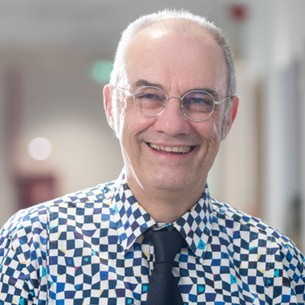 By Anghel Adrian Udrea, MD, PhD
By Anghel Adrian Udrea, MD, PhD
What words and concepts do we use to talk about career success?
Stellar is used now to name a brilliant professional. Role model was common in 1998, when I first attended an ASCO Annual Meeting. (To help you imagine that time, we were at the point of preparing to adopt the first version of RECIST, which was introduced in 2000.) When you come from a professional environment where meritocracy is not valued, learning from the giants at the ASCO Annual Meeting is like gunpowder. I started my residency very soon after the end of the Communist era in Romania. Professional values were upside down. It was up to you if you really wanted to become a highly qualified oncologist or not—there was no reward there. Everything was missing, starting with quality procedures and ending with oncology medication. I spent 6 months during my early residency (1993/1994) at Centre Becquerel in Rouen, France, which showed me for the first time the gap and made me want to get there, at that quality of services. The soil to sow was inside me.
Mentorship is another concept when we talk about career success, and we cannot emphasize its importance enough. I didn’t have the chance to have one. If I had, I might have avoided a lot of mistakes throughout my career.
A long residency in another cancer centre in a different country is of equal importance, another marker of progress. In 1998/1999, I had the chance to work for a year in the same centre in Rouen that was, at the beginning of my residency, a model of quality care. Everything I learned during my residency was extremely important for my future. Exposure to another culture, language, population, and mentality is already a big thing. Then there were the basics of research/clinical trials, the everyday workings of the practice team, the tumour board discussions, the practice staff trainings, and the organisation of work shifts.
These new experiences and new ways of doing things lead to growth. Today we call it emotional intelligence. It is what results when an open-minded person learns to observe.
All the above ingredients as well as passion and tenacity are mandatory for a successful career. After 30 years, I am trying now to share my experience.
ASCO membership gave me the chance to realize some of the most important career goals in my life. Licensing the Best of ASCO meeting in Romania in 2015 is the first. It meant bringing and sharing the latest knowledge at home, together with key opinion leaders. The next step was leading the medical team at Medisprof Cancer Centre to ASCO QOPI Certification, which recognizes practices that have demonstrated their commitment to the highest standards of quality and safety. Experience told me that if I wanted to build a quality care service, I needed the best standard procedures. Team motivation was the hardest part. Imagine a professional environment where, independently of what you do, the results, from the administrative point of view, are the same. I was asked, “Why do we have to learn new procedures when we already have some?” One example: the importance of oncology pharmacy staff training, equipment, and procedures for the success of your patient’s treatment plan. We completed the 6-month ASCO/ECO Foundation (Excelencia Y Calidad en la Oncologia) Quality Training Program, a natural continuation of our efforts toward quality and standardization of our services.
Today I am very happy to mentor young professionals and to contribute to ASCO steering committees. In Romania, there is still no meritocracy or mentorship programmes for young oncologists. In my institution, I am trying to share what I learned at different stages of my professional career, from a simple employee of a public hospital to today, where I am a leader in a private facility. My career has been a long road, and the story goes on. Leading the team, being able to learn coaching and applying it in everyday practice when you were not trained for this, is challenging.
My recent mission has been working with patient groups in order to help them—and help myself—to understand that life goes on. Learning how to support people beyond your office in rebuilding their life. Living in the family and with your friends without a stigma. Sometimes, convincing your employer that you can still do your job.
After 3 decades in the clinic, my emotional intelligence is now guiding me to find the role I can play in my wider community. Surprise: This is my doctor? Planting trees with me. Ready to walk with me on Via Transilvanica, a 1,400-km backcountry hike through Romania… and planning to build a hostel for those walking that will be self-sustained by the patients.
Dr. Udrea is a medical oncologist and medical director of Medisprof Cancer Centre in Cluj, Romania. Follow him on Twitter @UdreaAnghel. Disclosure.


Recent posts